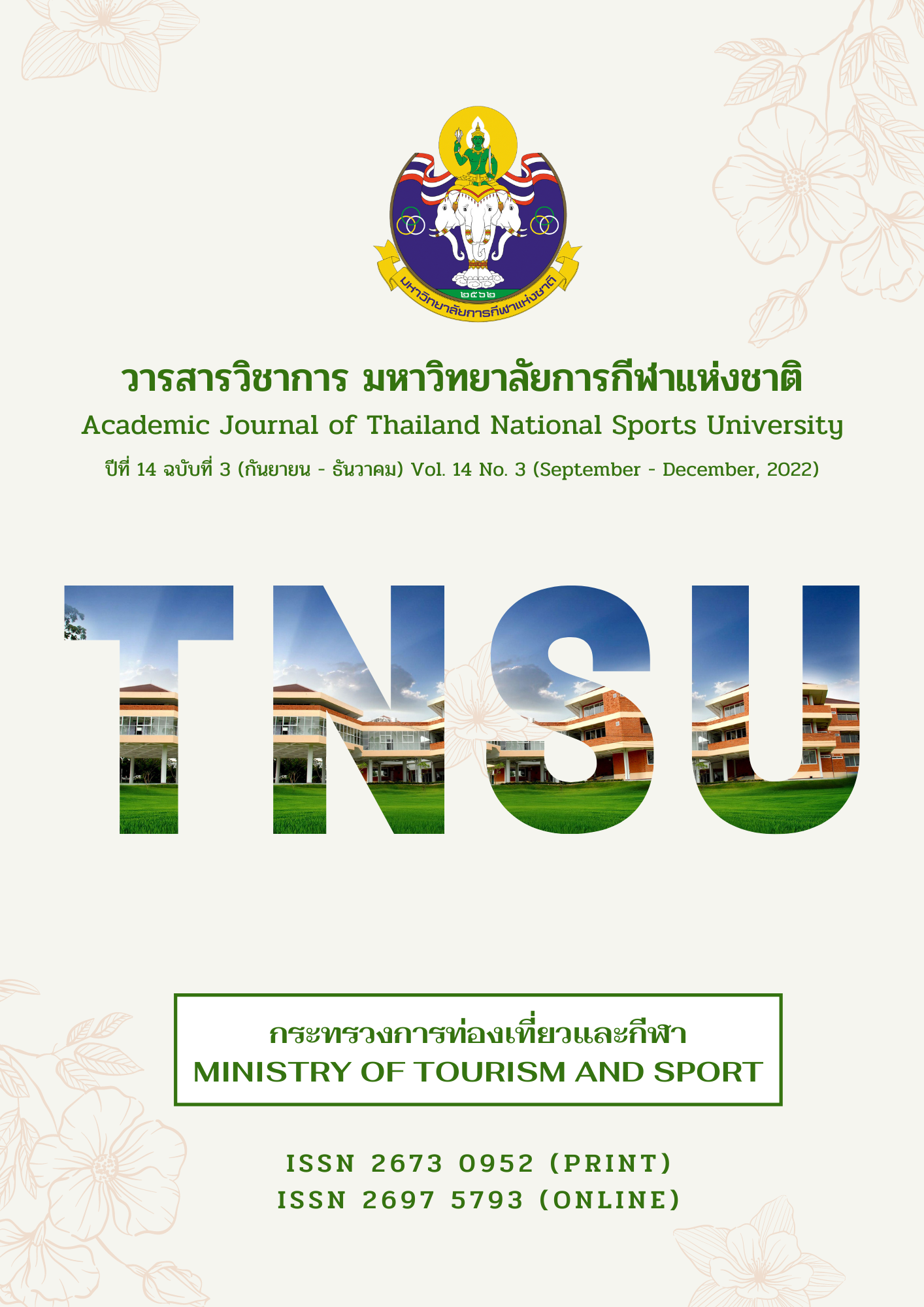EFFECTS OF PHYSICAL EDUCATION LEARNING MANAGEMENT USING SELF - REGULATION ON LEARNING ACHIEVEMENT AND EMOTIONAL QUOTIENT OF SECONDARY SCHOOL STUDENTS
Main Article Content
Abstract
The purposes of this research to study the effects of physical education learning management using self - regulation on learning achievement and emotional quotient of secondary school students. Methods: The subjects consisted of 52 high school students, divided into 2 groups with 26 students in the experimental group who received physical education learning management using self - regulation and 26 students in the control group who did not use physical education learning management using self - regulation. The research instruments were composed of the active learning lesson plan, containing 8 lesson plans with the physical education learning management using self - regulation, and emotional intelligence test. The data were they analyzed by mean, standard deviations and t – test. Results: The research findings were as follows: The mean scores of the learning achievement and emotional intelligence test of the experimental group students after learning were significantly higher than that before learning at a .05 level., The mean scores of the learning achievement and emotional intelligence test of the experimental group after learning were significantly higher than that of the control at a .05 level. The management of physical education learning using the self - regulation concept resulted in students significantly higher mean scores of academic achievement and emotional intelligence at the .05 level.
Article Details

This work is licensed under a Creative Commons Attribution-NonCommercial-NoDerivatives 4.0 International License.
The published article is a copyright of the Academic Journal of Thailand National Sports University. The passage appeared in each article in this academic journal is a perspective of each author which is not related to the journal. Each author is required to be responsible for all components of his/her own article. If there are any mistakes, each author must be responsible for those mistakes on his/her own.
References
Baumeister, & Vohs. (2004). Sexual economics: Sex as female resource for social exchange in heterosexual interactions. Personality and Social Psychology Review, 8, 339–363.
Department of Mental Health. (2015). Event Guide “Practice to think, solve problems, develop EQ” for volunteers / leaders of the Phue Jai Center TO BE NUMBER ONE Revised Edition, 2015. Kaew Chao Chom Media and Publishing Center.
Department of Mental Health. (2017). Elements of emotional intelligence. Retrieved from http://www.dmh.go.th/news/view.asp?id=1036
Department of Mental Health. (2000). Handbook of Emotional Intelligence. Bangkok: Ministry of Public Health.
Goleman, D. (1995). Emotion Intelligence. New York: Bantam Books.
Hetherington. (2017). Definition of physical education. Retrieved from https://sites.google.com/ site/adisakwizardmanu/prawati-swn-taw?tmpl=%2Fsystem%2Fapp%2Ftemplates%2F print%2F&showPrintDialog=1
Jirayu Lertchareonwanich. (2013) Self - control. Retrieved from http://cuir.car.chula.ac.th/ handle/123456789/44617
Kodchamon Thanawong. (2013). Effects of health education learning management on personal health care using self - regulation theory on health behaviors of elementary school students (Master's thesis), Chulalongkorn University.
Kanin prayoonkiat (2011). The Effect of Physical Education Learning Management in Flag Football Sport on Intelligence The mood of elementary school students according to the concept of Goman (Master's thesis), Chulalongkorn University.
Office of the National Economic and Social Development Board. (2017-2021). Economic Development Plan and the National Society No. 12. A Guide to Events “Thinking and solving problems, developing EQ” for volunteers / leaders of TO BE NUMBER ONE Friends Center, 2015 edition.
Office of the Education Council Secretariat (2009). A study of knowledge on characteristics of Thai people at Desirable: Emotional Intelligence. Bangkok: Chili Sweet Graphic Co., Ltd.
Praiwan Tanlaput. (1987). Introduction to Physical Education (2nd ed.). Bangkok: Chulalongkorn University Press.
Poranee Siriwisansuwan (2011). The effect of physical education learning management under the neo - humanoid concept on the Emotional intelligence of middle school students (Master's thesis), Chulalongkorn University.
Scott B. Parry. (1998). Evaluation the impact of Training Alexandria. VA: American Society for training and Development.
Supawadee Kamnadee. (2008). Research and development of self-governance process for mathematics instruction to enhance self – efficacy, attitudes and learning achievement of eighth grade students (Master's thesis), Chulalongkorn University.
Thanawat Chuaibamrung. (2017). Effects of physical education activity management between takraw and volleyball on emotional intelligence for lower secondary students (Master's thesis), Chulalongkorn University.
Thanyaporn Mahadilokrat. (2014). Effect of a self - regulation program on sufficiency characteristics of eleventh grade students (Master's thesis), Chulalongkorn University.
Therdsak Dejkong. (2004). Emotional intelligence to intelligence. Bangkok: Matichon Publishing House.
Udon Rattanaphak. (2016). Philosophy of Physical Education. Retrieved from http://opor23.blogspot.com
Worasak Pianchob. (2005). Include articles on philosophy, principles, teaching methods and measurement for Evaluate physical education. Bangkok: Chulalongkorn University Press.


